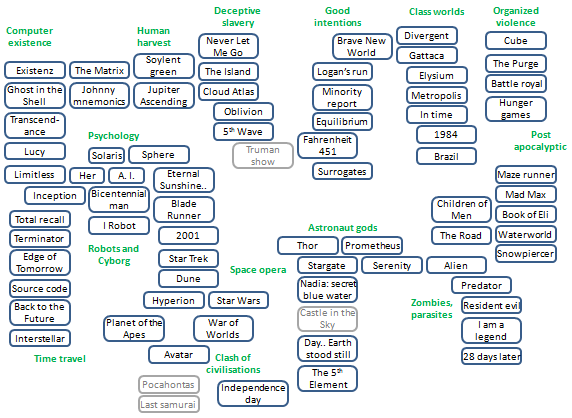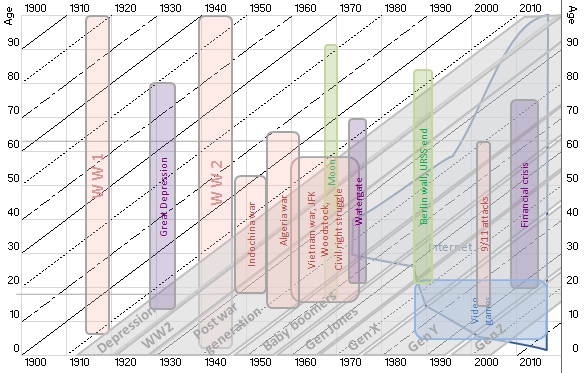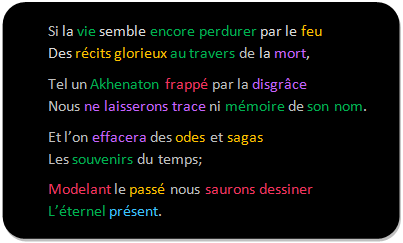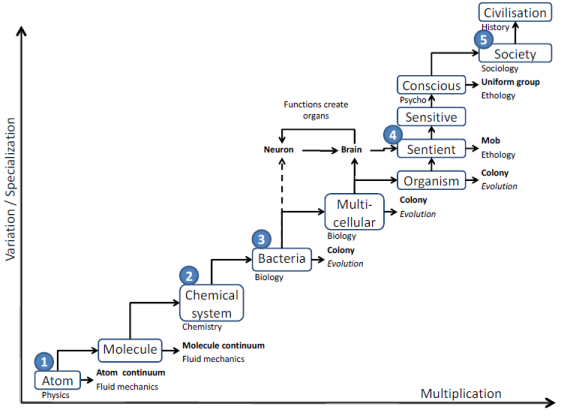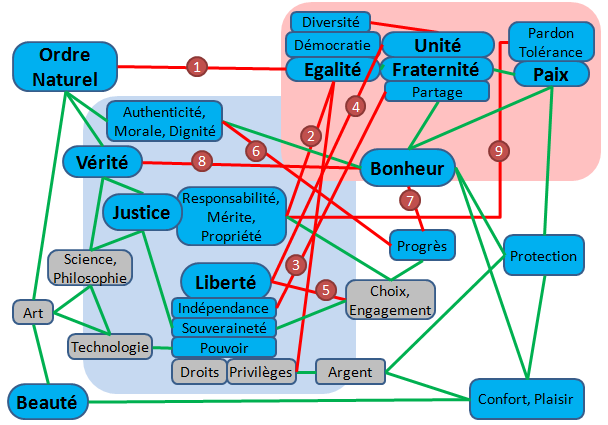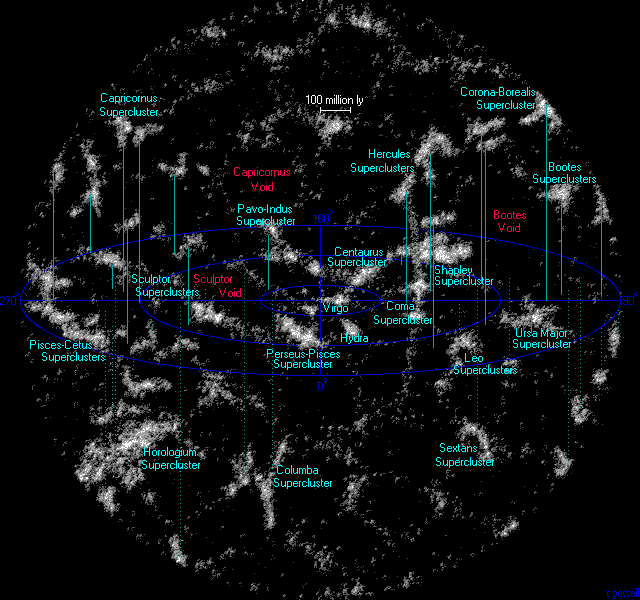Exergy
19th century's physics explained that all closed systems must evolve into states of higher disorder. This disorder can also be also seen as a dilution of matter and energy: electric charges migrate toward lower potential, radioactive atoms disintegrate into more stable isotopes, high pressure expand into broader space, motion causes friction and converts kinetic energy into thermal energy, heat dilutes into matter of lower temperature... Physics quantifies this amount of disorder-dilution by entropy (from Greek τροπή, change) In any closed system, entropy has to increase. This 2nd law of thermodynamics dictates the time direction in which systems will evolve. This arrow of time cannot be reversed, unless no dilution occurred, or if more entropy is produced elsewhere.
Another way to look at entropy is to measure exergy. It is the opposite idea of entropy, short from of "extractable energy". When entropy is created, exergy is destroyed. Energy cannot be destroyed, it is conserved and converted into diverse forms. (In the case of nuclear reactions, following e=mc2, one considers energy and matter altogether as conserved.) Exergy is the extractable, or "useful", fraction of energy in a system, which can be extracted to produce work and drive motion. Electrical and mechanical energies are virtually 100% exergy, but heat, pressure, and chemical potential depend on how they differ from the surrounding. 1m3 of air at 1bar is useless on the Earth, because it is surrounded by the same pressure, but in outer-space is could produce work by dissipating into vacuum. After all exergy is taken from a system (battery, air tank, fuel, etc.), this system is at equilibrium with the environment and cannot dilute further. This can be compared to a spring of energy and matter which expands and dilutes.
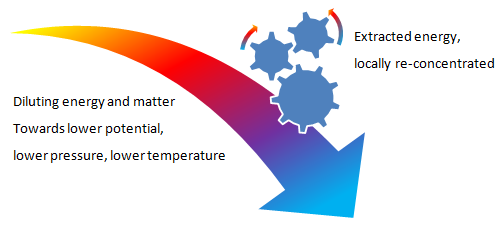
It is to be noted that exergy can be destroyed without any "practical" use (e.g. an electric heater in the ocean..). The definition of exergy pertains to physics and is not anthropocentric, but rather independent from human cultural judgement. (I've discussed it in this 2008 article (in French) )
First conclusion: mass and energy dilution, causing exergy consumption, drives the motion of the universe. It fuels all physical reactions which build this movement into... more complex structures.
Emergence
Emergence is the name given to the phenomenon whereby the complex interactions of many simple elements generate new overall behaviours and entities. For example: life emerges from chemical systems. Life involves behaviours such as metabolism, reproduction, adaptation, which are all new compared to the underlying chemical systems, and could not have been predicted by the study of the chemical level.
I've discussed this in a 2012 note, linking scientific fields in Russian doll emergence. I proposed the historical generation: Physical => Chemical => Biological => Psychological => Social. We see a rise of abstraction, and gradual irrelevance of "hard sciences" to study higher levels, replaced by humanities.
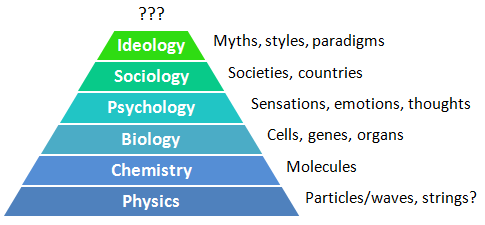
We can distinguish that the 2 necessary ingredients of emergence are the multiplicity of the entities (quantitative), and their specialization (qualitative). Hence emergence moves on through Zig-zag evolution, gaining complexity through both moves.
Emergence produces entities which survive when the underlying components disappear. For example, in a population of bacteria, if one individual mutates with a new better suited DNA trait, it will be inherited by its offspring and gradually become a trait of the whole population. It will survive in the population even after the death of the first new DNA bearer. An invention or an artistic style can still exists after the death of the civilization that made it.
A time goes by, more complex systems arise, which unify smaller components into a whole. Across history, civilizations consist of several societies, made of individuals. A person unifies organs, which unify countless cells, in turn unifying countless molecules, made of atoms.
Second conclusion: emergence federates the motion of small items into larger, fewer, harmonious, and novel entities. Like a pyramid building bottom-up, higher abstract levels gradually come into existence.
What our History-Universe might look like, from A to Z.
Both principles coexist:
...the destructive dispersing impulse of exergy,
...and the creative unifying rise of emergence.
Following the intuition of the Jesuit palaeontologist Pierre Teilhard de Chardin, we could call Alpha the space-time origin of exergy (probably the so-called Big Bang) and Omega the final unified emerging state of the universe. (I do mean "state" and not "point". This ultimate unification will occur at a given future time, but would probably encompass the whole universe itself.) This model does not imply that a god kicked the alpha and attracts us to the omega... but why not? At the bottom line of a complete picture of the universe, science and spirituality must be in agreement.

PS: Gravity seems to be a bump on the road to entropy... since it tends to aggregate things together, and to sediment solids from liquids, seemingly creating order. In case the universe lacks of momentum, gravity would make it end up in a Big Crunch, all would go back to the Alpha square one! Hopefully we got enough exergy and time to reach Omega, and a godly handshake.
Addenda 2016-07-25: After reading (at last!) Hawking "Brief History of Time", i understand that gravity represents negative exergy, so that the total exergy of the universe is always zero. During the spacial dilution of energy and matter, doubled by space-time expansion, a large share of the original exergy is transferred into gravitational potential exergy. I find dubious that that entropy would be already maximal when the universe will start to contract back again. I'm pretty sure we'll still have few more billion years to surf on the exergy waves and build further the pyramid!
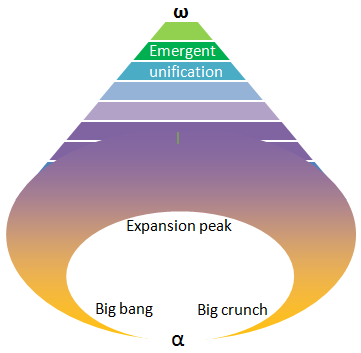
Once again i found that illustrating entropy merely as "disorder" is misleading and limited. A blank hard-drive has more thermodynamic order than the one containing Beethoven's symphonies. One shouldn't confuse the levels of the emergence pyramid. Biological or aesthetic order are far beyond thermodynamics. In that sense, the so-called Theory of Everything would be humbly relevant only to the bottom of the pyramid.
PPS: Vincent Mignerot summarizes (in French) ideas from François Roddier and Eric Chaisson, and pessimistically proposes that emergence is only a mean to creates structures able to destroy exergy even faster. Hmmm.. maybe yes. Then it's a race: I use you to grow up, you use me to blow up.
L'article a été mis sur Facebook ici.

